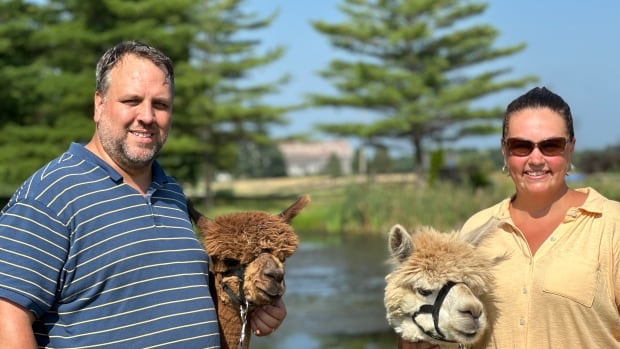 [London](/news/canada/london) 20 years ago, 5-10 alpaca farms were in the province, farmer says.Now there are over 60 Agri-tourism draws thousands of people from Ontario out of cities and into the countryside every year to enjoy and learn about the intricacies of farm life and enjoy events and activities with an agricultural theme, but a curious trend has been emerging over the past few years.A boom in the popularity of alpaca farms is driving a shift in the agri-tourism sectors of some areas, with at least 60 of them listed on Google alone, from Windsor to Ottawa and everywhere in between.Certain alpaca hotspots exist as well, like the region west of Kingston and the area around London.”Alpaca farms are a huge part of agri-tourism in Middlesex County.With seven-plus farms, factoring in just the different types of agri-tourism businesses, alpacas are a huge part,” said Taylor Rummel, Middlesex County’s tourism expert.
[London](/news/canada/london) 20 years ago, 5-10 alpaca farms were in the province, farmer says.Now there are over 60 Agri-tourism draws thousands of people from Ontario out of cities and into the countryside every year to enjoy and learn about the intricacies of farm life and enjoy events and activities with an agricultural theme, but a curious trend has been emerging over the past few years.A boom in the popularity of alpaca farms is driving a shift in the agri-tourism sectors of some areas, with at least 60 of them listed on Google alone, from Windsor to Ottawa and everywhere in between.Certain alpaca hotspots exist as well, like the region west of Kingston and the area around London.”Alpaca farms are a huge part of agri-tourism in Middlesex County.With seven-plus farms, factoring in just the different types of agri-tourism businesses, alpacas are a huge part,” said Taylor Rummel, Middlesex County’s tourism expert.
The alpaca craze has even begun to draw people out of the Greater Toronto Area (GTA) and into southwestern Ontario, according to Rummel.It’s a trend that’s still gaining steam, despite having reached the London area roughly five years ago, she said.
The main draw for tourists to visit alpaca farms are guided tours, countryside walks, picnics and, in some cases, even yoga all involving alpaca.Fuzzy friends Crystal Pruellage and her husband Josef bought Stoneleigh Farm, just west of London, about 3½ years ago.They started small, but it wasn’t long before she noticed the farm felt empty and alpacas might be the solution.”I wanted to find a way to share the animals with other people, too,” said Pruellage.
Taking note of some local farms offering interactive experiences, the Pruellages took the plunge and never looked back.”I think they’re just exotic and not everybody has seen them.They are super fuzzy and you just want to kind of cuddle them,” she said, while watching one alpaca roll playfully in the grass.”They have such unique personalities and each bond is unique as well.” She said Stoneleigh Farm cares for 19 alpacas, all of them with different quirks and different haircuts — like mohawks and mullets — to help their owners tell them apart.
Easy to care for, easy to love On top of being loveable and interactive, a contributing factor to Ontario’s ever-increasing alpaca population is ease of care, Crystal said.”If you have land, enough grass and hay, and a calm environment, they’re easy.” Normally, alpacas are from hilly and mountainous regions of South America, where grass isn’t abundant and nutrients are derived from moss and lichen, she added.
“Here in Ontario, we have ample access to minerals and ample access to grass.” Aside from food, alpacas are perfectly happy to take care of themselves, giving themselves dust baths to stay clean.The animals, which have a wool-like coat that is called “fibre,” get shorn once a year — yet another way they provide income to their keepers.Alpaca farmers unite Yvonne Houle has been there since the beginning.
She runs S.A.M.Y.’s Alpaca Farm, which used to be the only such farm in the London area.S.A.M.Y.’s started 20 years ago, when only five to 10 alpaca farmers were operating in the entire province.”We all had fibre underneath our beds, in the attics, in any kind of storage, but nobody knew what to do with it,” she said.
Houle and other farmers’ solution was to start a co-operative, known as the Alpaca Fibre Co-operative of Ontario (AFCO), to provide support, education and pool resources to use and sell alpaca fibre.
Since then, the scarves, socks and mittens have been flowing in abundant supply, making farmers a pretty penny along the way.”It’s very soft.It’s very warm.It’s warmer than wool.It’s not scratchy like wool.It’s a premium, exotic product,” said Houle, who recommends alpaca fibre hiking socks and work socks.As for the increasing popularity of alpacas, Houle sees a blessing and a curse.
“I have quite a bit of competition now,” she said.”But you know, competition keeps us on on on our feet.”.
